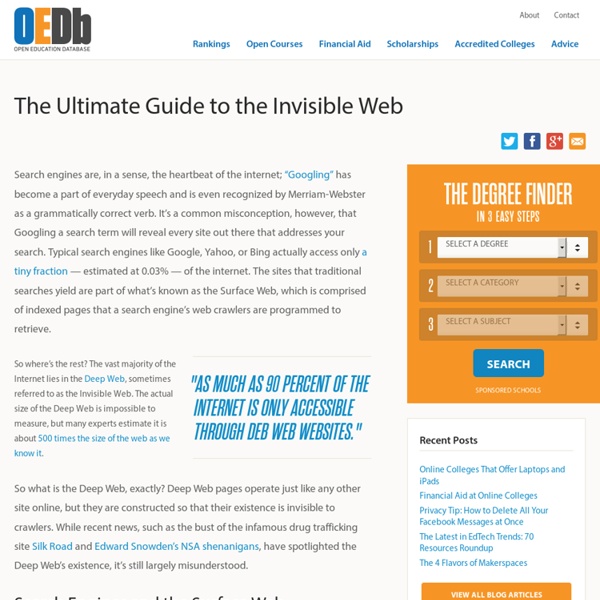10 Search Engines to Explore the Invisible Web
Not everything on the web will show up in a list of search results on Google or Bing; there are lots of places that their web crawlers cannot access. To explore the invisible web, you need to use specialist search engines. Here are our top 12 services to perform a deep internet search. What Is the Invisible Web? Before we begin, let's establish what does the term "invisible web" refer to? Simply, it's a catch-all term for online content that will not appear in search results or web directories.
News aggregator - Wikipedia
Function[edit] Visiting many separate websites frequently to find out if content on the site has been updated can take a long time. Aggregation technology helps to consolidate many websites into one page that can show the new or updated information from many sites. Aggregators reduce the time and effort needed to regularly check websites for updates, creating a unique information space or personal newspaper.
99 Resources to Research & Mine the Invisible Web
College researchers often need more than Google and Wikipedia to get the job done. To find what you're looking for, it may be necessary to tap into the invisible web, the sites that don't get indexed by broad search engines. The following resources were designed to help you do just that, offering specialized search engines, directories, and more places to find the complex and obscure.
The Invisible Web: A Beginners Guide to the Web You Don't See
By Wendy Boswell Updated June 02, 2016. What is the Invisible Web? The term "invisible web" mainly refers to the vast repository of information that search engines and directories don't have direct access to, like databases. Unlike pages on the visible Web (that is, the Web that you can access from search engines and directories), information in databases is generally inaccessible to the software spiders and crawlers that create search engine indexes. How Big is the Invisible Web?
How-To Find Files In Unprotected Directories
We’ve all got a little voyeurism in us. That’s a big reason why the post, Clearing Google Search History to Maintain Your Privacy sent my visitor counts off the charts :). In this article, I’m going to show you how to create search queries that will list the contents of unprotected directories on the internet. You’ll be able to play the music files, watch the videos, look at photos and more. I have to say, it’s really addicting.
White Paper: The Deep Web: Surfacing Hidden Value
This White Paper is a version of the one on the BrightPlanet site. Although it is designed as a marketing tool for a program "for existing Web portals that need to provide targeted, comprehensive information to their site visitors," its insight into the structure of the Web makes it worthwhile reading for all those involved in e-publishing. —J.A.T. Searching on the Internet today can be compared to dragging a net across the surface of the ocean.
Deep Web Search - A How-To Site
Where to start a deep web search is easy. You hit Google.com and when you brick wall it, you go to scholar.google.com which is the academic database of Google. After you brick wall there, your true deep web search begins. You need to know something about your topic in order to choose the next tool.
Deep Web Research and Discovery Resources 2014
Bots, Blogs and News Aggregators ( is a keynote presentation that I have been delivering over the last several years, and much of my information comes from the extensive research that I have completed over this time into the "invisible" or what I like to call the "deep" web. The Deep Web covers in the vicinity of trillions upon trillions of pages of information located through the world wide web in various files and formats that the current search engines on the Internet either cannot find or have difficulty accessing. The current search engines find hundreds of billions of pages at the present time of this writing.
An Up-To-Date Layman's Guide To Accessing The Deep Web
If you binge-watched the second season of House of Cards, along with a reported 15% of Netflix's 44 million subscribers, you may be newly interested in the Deep Web. Slate has done a good job of describing what the Deep Web is and isn't, but they don't tell you how to get there. How To Access The Deep Web First: the hot sheets.
100 Useful Tips and Tools to Research the Deep Web
By Alisa Miller Experts say that typical search engines like Yahoo! and Google only pick up about 1% of the information available on the Internet.



